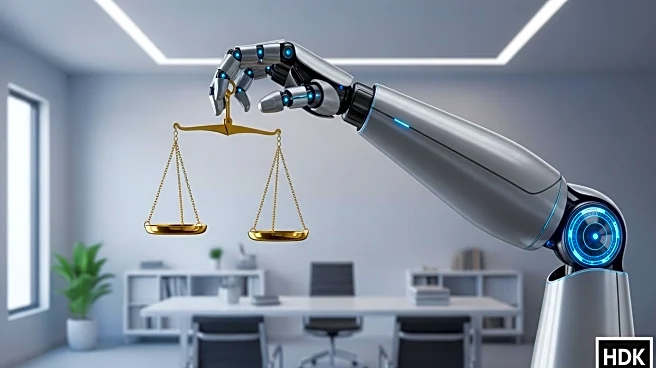What is the story about?
What's Happening?
Law firms are increasingly incorporating artificial intelligence (AI) tools to enhance efficiency and client success. However, experts caution that lawyers must adhere to ethical obligations, particularly in safeguarding client data. During a recent online discussion, panelists highlighted the importance of balancing technological advancements with ethical considerations. While AI offers significant benefits in streamlining legal processes, it also poses risks related to data security and privacy. Lawyers are urged to ensure that AI tools do not compromise client confidentiality and to remain vigilant about potential ethical violations.
Why It's Important?
The integration of AI in law firms represents a significant shift in the legal industry, offering opportunities for improved efficiency and client outcomes. However, the ethical implications of using AI are critical, as they impact the trust and integrity of legal practices. Ensuring data security and compliance with ethical standards is essential to maintaining client confidence and avoiding legal repercussions. As AI becomes more prevalent, law firms must navigate the balance between technological innovation and ethical responsibility, which could influence their reputation and competitive standing in the industry.
What's Next?
Law firms are expected to continue adopting AI tools while developing comprehensive policies to address ethical concerns. This includes implementing robust data protection measures and training staff on ethical AI usage. As the legal industry evolves, firms may collaborate with technologists and ethics experts to establish best practices for AI integration. Ongoing discussions and workshops on AI ethics will likely become more common, helping firms stay informed about emerging challenges and solutions. The development of industry-wide standards for AI usage in legal practices could also be on the horizon.
Beyond the Headlines
The ethical use of AI in law firms extends beyond data security to broader issues of transparency and accountability. As AI systems become more autonomous, questions arise about decision-making processes and the potential for bias. Law firms must consider the implications of AI-driven decisions and ensure that they align with ethical and legal standards. The evolving nature of AI technology requires continuous monitoring and adaptation to address new ethical dilemmas. This ongoing dialogue is crucial for maintaining the integrity of the legal profession in the digital age.















